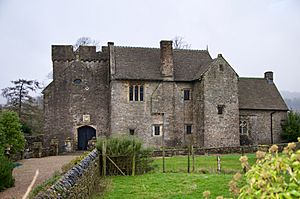Penhow Castle facts for kids
Quick facts for kids Penhow Castle |
|
|---|---|
 |
|
| Type | Castle |
| Location | Penhow, Newport |
| Built | 12th century onwards |
| Architectural style(s) | castellated |
| Governing body | Privately owned |
|
Listed Building – Grade II*
|
|
| Official name: Penhow Castle | |
| Designated | 1 March 1963 |
| Reference no. | 3078 |
|
Listed Building – Grade II
|
|
| Official name: Barn to south-west of Penhow Castle | |
| Designated | 24 February 1976 |
| Reference no. | 3056 |
|
Listed Building – Grade II
|
|
| Official name: L-shaped Byre Range to south-west of Penhow Castle | |
| Designated | 24 February 1976 |
| Reference no. | 17079 |
|
Listed Building – Grade II
|
|
| Official name: Stable Block to far south-west of Penhow Castle | |
| Designated | 19 December 1995 |
| Reference no. | 17081 |
|
Listed Building – Grade II
|
|
| Official name: Five bay Barn and attached Byre to far south-west of Penhow Castle | |
| Designated | 19 December 1995 |
| Reference no. | 17080 |
| Lua error in Module:Location_map at line 420: attempt to index field 'wikibase' (a nil value). | |
Penhow Castle is a very old castle located in Penhow, Newport. It started being built in the early 1100s. Since then, it has been changed and added to in almost every century. Many people believe it is the oldest castle in Wales that has been lived in continuously. Today, the castle is a special building protected by law, known as a Grade II* listed building.
Contents
History of Penhow Castle
Early Beginnings and Norman Times
The land where Penhow Castle stands was once owned by Caradog ap Gruffydd. He was a prince of Gwent. This was around the time of the Norman invasion of Wales. During this invasion, the Normans took control of many lands.
The Seymour family, also known as de St. Maur, took over the estate. By the year 1129, Sir Roger de St Maur had built a strong, fortified house there. This was the very first version of Penhow Castle.
Changes Over the Centuries
Over the years, the castle grew bigger and stronger. Major additions and changes were made in the 1400s and 1600s. In the 1500s, the castle passed to the Somersets, another important family.
Later, in 1674, the Lewis family of St Pierre bought the castle. They owned it for many years.
Modern Era and Restoration
In 1914, Viscount Rhondda bought Penhow Castle. He was a wealthy businessman who cared a lot about old buildings in Wales.
By the middle of the 1900s, the castle was not in good shape. It was starting to fall apart. Then, a film director named Stephen Weeks bought it. He worked hard to fix it up and bring it back to life. During his time, the castle was open for visitors to explore. It was also where he lived.
In 2002, the castle was sold again. It became a private home once more. Penhow Castle is still often called the oldest continuously lived-in castle in Wales.
Architecture and Design
What Penhow Castle Looks Like
The castle is built from local stone called Old red sandstone. It uses rough, uneven pieces of stone, which is called rubble. An expert on old buildings, John Newman, described Penhow as "small" and not looking "convincingly defensive." This means it might not have looked as strong as some other castles.
Oldest Parts and Later Additions
The oldest part of the castle is the west tower. This tower dates back to when the Seymour family first built the fortified house.
The main hall of the castle has two floors. This part was added later, between the 1300s and 1400s. More big changes happened in the 1600s and 1700s. During this time, the castle was made more comfortable to live in, like a country house, rather than just a fortress.
The official records from Cadw (the Welsh government's historic environment service) mention the "exceptionally fine Restoration period interiors." This means the inside of the castle has beautiful designs from the Restoration period in British history.
Other Buildings Around the Castle
Around Penhow Castle, there are other old buildings. These were used for farming and other activities. They also have their own special protection.
- Close to the castle, to the south-west, there is a barn and a byre (a cowshed).
- Further away to the south, there is another barn, another byre, and a stable block for horses.
These buildings show how the castle estate was used for farming over many centuries.
Sources

